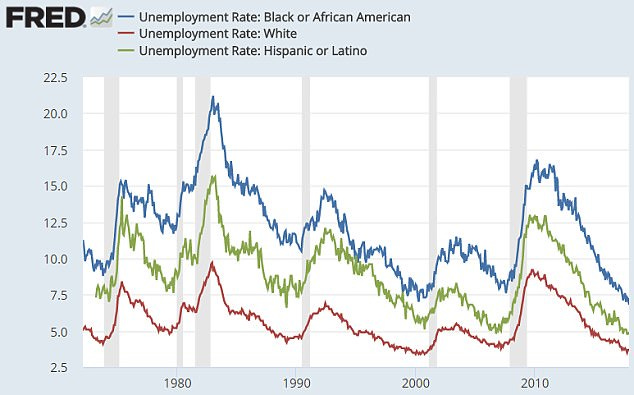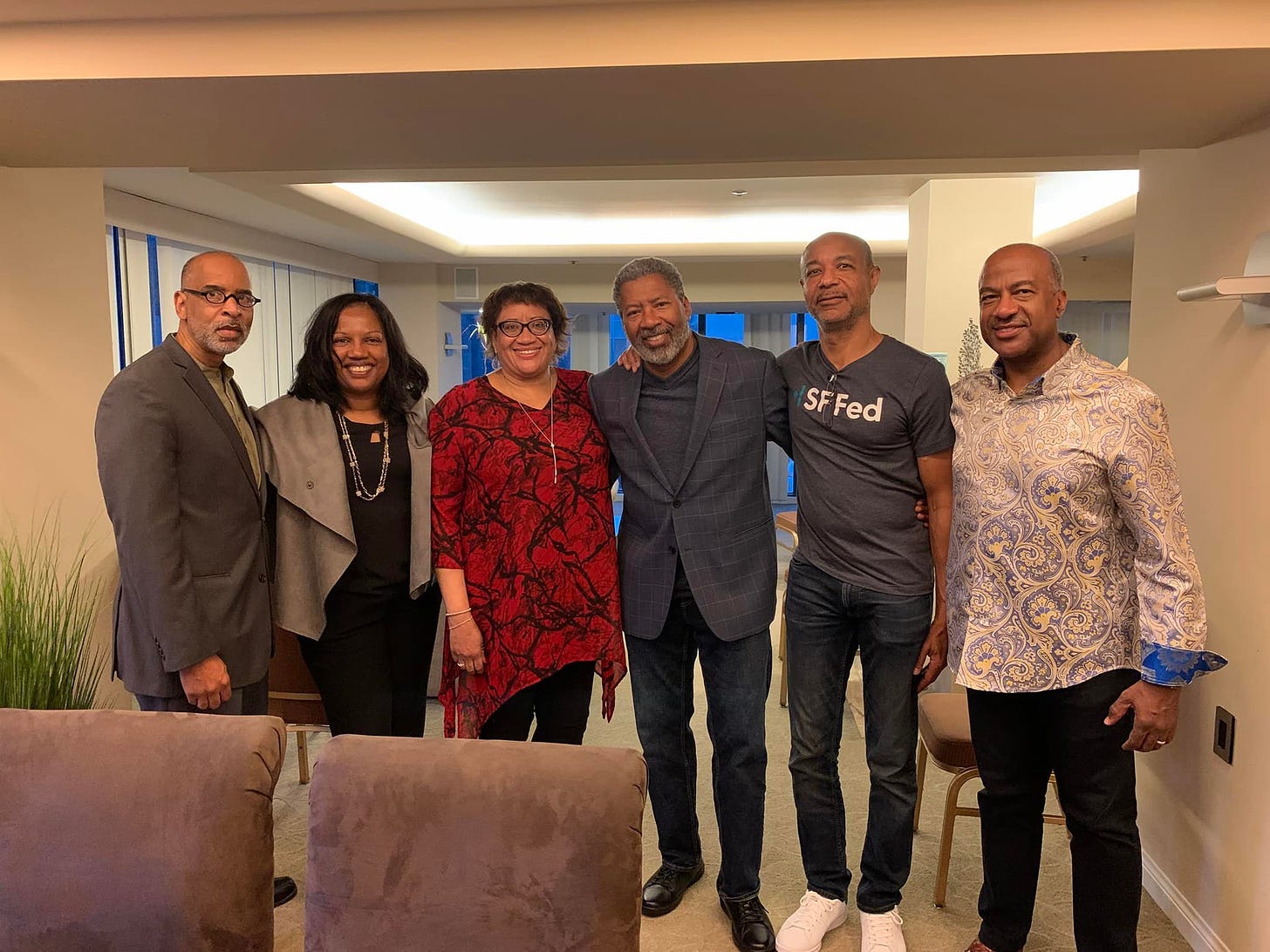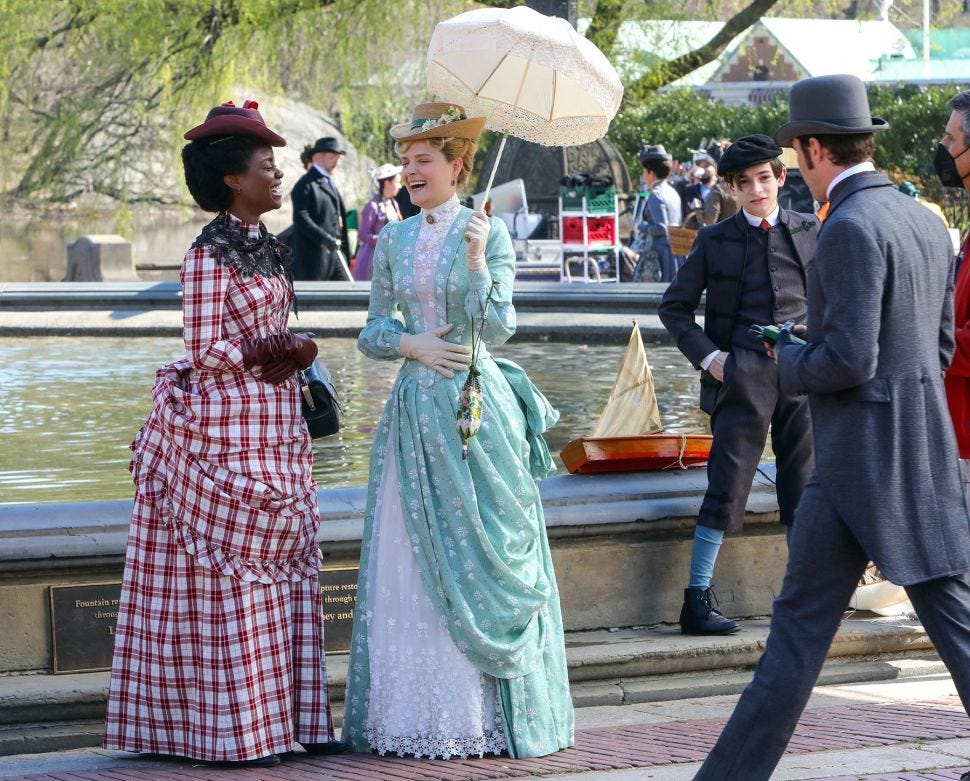I was asked by that consummate New Yorker Greg Thomas what statistical data I might know about black victimization that everybody assumes but nobody seems to be able to quantify. I don’t have anything more substantial than the garden variety two dimensional racial traffic that presents itself as ‘research’ these days. You know, the charts like this.
What I do have, I suppose like everyone else, is a vague set of heuristics by which I make some assessment of blackfolks’ reality. Unlike everyone else, I have a background in big data and no dog in fights that have no error-correction methodology and I have no particular need to prognosticate.
As I write the first draft of this, I am fresh from meeting with old friends who were part of the leadership team of National Society of Black Engineers. So I am enjoying warm and fuzzy thoughts about who we were and what we accomplished in the 1980s to cultivate and sustain black American interest in technical education. Recruitment, retention and successful graduation was our agenda. Rumor has it this agenda is not holding together so well. Nevertheless there were about 11,000 attendees this past March in Anaheim at the national convention.
There is a culturally bred kind of success that goes along with the previous necessity of items like the Green Book. These are roadmaps to Black Success. They contain data like lists of the airlines that allow blacks to fly, the restaurants seats blacks with everyone else, workplaces that are not so hostile. This special information is stuff that the black communities always feel that they need. There’s always a first generation going to college. There’s always the first person trying to break into Hollywood. Yet these people don’t necessarily communicate well with each other, they think they’re always the first. Similarly, they are not communicating with other black folks who have been successful in the way they think they’re the first. There may be a number of black firsts still to be accomplished, but I think they are fewer than most people would guess.
In other words many black Americans believe they are underdogs where in fact they’re just isolated from large enough sets of people for whom their work is typically similar. Consequently many white Americans think they’re cheering for the underdog, but in fact they just don’t know enough black folks. These half perceptions combine to make a secondary standard which is so embedded that people have to say stuff like this:
In order to normalize black achievement, treat black achievement like it’s normal.
Everybody black who knows dysfunctional blackfolks have an example if not a reason to believe blackfolks are dysfunctional everywhere. The story that gets publicized is the story of a confession of your own dysfunction and your own inability and the tale of rescue and overcoming. So it keeps that myth alive. One of the reasons self-esteem comes into the picture is that people are victims of their own foolishness. While it only takes a little bit of a push for people to get over that personal hump. I think objectively speaking, lots of Americans need psychological counseling, and they don’t get it. They ‘get it’ in the form of “God is ministering to me“ or ”this is the black way, you know how we do”. These are the siren calls of the black Mandalorian. An entire life’s quest can be motivated by that exact same origin story.
“We were once a great and glorious empire. We were betrayed and we lost everything. Now we are scattered and we must wear this armor. We must not show our faces. This is the way”.
Holding to that code of honor or fidelity to any kind of blood and soil ethnic origin is always corrosive of a cosmopolitan open society. It is the sort of prejudice one might easily imagine during the Gilded Age. Only legit, rich families know how to be rich and legit, goes the sentiment. Memes from that era are thick today.
Such an incestuous regime can always be run by a criminal overlord of the Network who presents the right mask to the public. Still, I find the the signals through the network of black Americans are much too diverse and contradicting to sustain such a criminal overlord. I simply think the overwhelming majority of Americans don’t take such folks as Sharpton and Jackson quite seriously any longer. In that regard, Barack Obama was the last black unicorn. The desire for and fidelity to ‘black leaders’ has fizzled. That doesn’t change the hold an amorphous ‘black culture’ has on Americans. Part of today’s problem with race is the desperate need to define an orthodox blackness against which every offense must be cataloged and shouted out. Believe me that some of you are wrinkling your noses at this very moment. If not, keep reading.
Black Youth
Never forget that there are real friendships and bonds between those isolated youth who called themselves the future of black America. They are not willing to admit that they are young and stupid, they will think that they are authentically black and being held back but not by their own ignorance. That’s the message that they don’t want to hear. The confirmation bias of black inferiority is a psychological fact we all must deal with, and those who have never traveled beyond their own states and target demographic are often trapped with those as well-accepted facts of life. Even their rescue from second-class environment reinforces the circle. Any uplift program run by sympathetic blackfolks can generate a devoted allyship for life. And that’s where the black solidarity comes out.
This is true of things black Americans have been doing for generations, like pledging fraternities and sororities. It was a temptation I could not resist in the 80s even though neither of my parents were members of black legacy fraternal organizations. My paternal grandfather was a Mason, an Elk and a Shriner and an honorary member of the Yale Phi Gams. A lot of good that did. My father pledged a local frat at UConn, my mother did nothing of the sort at Dillard. Is every black organization that fails to define black culture or defeat anti-black racism a failure? Of course not. Neither of these are appropriate standards. And yet these organizations flourish then fade over time delivering specific benefits to their specific members. They are legion, they are legit, they have their disparate rules and idiosyncrasies and they each speak to a mere fraction of all black Americans. Can we accept this matter of black cultural diversity? Must it always have a political or economic payoff?
Yet somehow we are led to believe every testimony speaks to all of black America, especially those tainted with that defensive flavor of blue lament and hostility. It seems all portraits of black America are of a resting bitch face, a cool pose, man in handcuffs. All true, all fractional, all the damned time. This too supports the Black Mandalorian myth.
—
Bogus Positivity
If I have any credibility on the matter, it comes from the generic criticism I’ve received over the years any time I’ve been bold enough to say something black stinks. It took all of 10 minutes of registering Republican for me to be called ‘anti-black’ back in 2003. It follows a kind of reverse one-drop rule. Once your black card is canceled you can never go back says this bogus rule. But it cuts the other way as well. What if I am subconsciously anti-black? For example, as a black person looking at the white people I know, I’m not going to say that they are exceptional. I’m going to say that I can get along with all sorts of whitefolks because of the examples set by those I do get along with. Maybe I’m creating a bogus counter racist myth by saying that people are basically good, knowing full well that people aren’t basically good. People basically follow their self interest which can always be racially flavored. Everybody can wear a mask and say this is the way. My point is that victimization is not the only ethos in this mask wearing sickness. There are happy masks too, all based on racial identity.
When I was growing up, the happy mask and attitude was called “soul”, something native to ‘all’ black culture. Attitudinally, it was more inclusive than the current aesthetics. You knew who had it. You knew who did it. You knew who would strive to become soulful as an existential necessity. What Negro parent would let their kids betray the essence of soul? That’s like saying Marvin Gaye’s What’s Going On was just a fetish. Who would dare say that? There’s a very good book I recommend that documents productions of the post-soul aesthetic. That’s who would dare say that. As we were just talking about, this one-size fits all black monolithic mask was easier to do 5 years after the Brown decision, but three generations of black Americans dispersed to the four winds only believe they can represent blackness.
Allmuseri
One of my favorite books when I was a young man representing the New World Afrikan jet set was Charles Johnson’s Middle Passage. It told the story, if I remember correctly, of a tribe of Africans, the Allmuseri, who successfully hijacked a slave ship by outwitting the captain and crew. Once or twice since then I considered the possibilities of a crypto-society of black elites to gather under such a banner. I’m a bit too far gone for that possibility. Besides, for a decade ‘Allmuseri’ was a Googlewhack. No results returned from the biggest search engine on the planet. I’m surprised to find it now has hit 7,500 times. On the other hand, my own name has 1000x as many hits, which is even more surprising. Nevertheless, as timeworn aphorisms go, I am fond of thinking positively about the living and cynically about the dead. So as bold as any African thought he might be taking over a slave ship, the bones of the majority of those who tried can be found at the bottom of the ocean. They did not become any of our ancestors. Their courage can only inform us in myth. The lions do not have their histories. We don’t get to claim the Allmuseri any more than little girls get to claim Disney’s Ariel or Princess Diana, daughter of Hippolyta Queen of the Amazons and Zeus, the mightiest of the gods of Olympus.
That leaves us with what? Reality and time. We have the same control over time as anyone else, which is to say none whatsoever. We have the same control over reality as anyone else, which is to say very little. The best any of us can do is reconcile ourselves with it as accurately as we possibly can. If you decide not to, how can I put it politely? Sooner or later somebody’s going to get you hooked on their fentanyl. That will be your reality. Best work on the Epistemics.
Unlike the vagaries of a casually disciplined black ethnic orthodoxy and its sustaining myths, I am confident enough that the universe is not capricious. It is sufficient to know and practice that slice of life you know and to keep in touch with reality. Myths can be useful shortcuts to sophistication, but they have limits. Those limits are demonstrated in the study of history. The proliferation and sustaining of old and new racial myths do and will continue to empower all sorts of cliques and clans. The truth will always need to be determined independent of the racial flavor. This is necessary to keep society cosmopolitain and open. This is what we owe our nation if it is to continue to evolve from the myths of the Gilded Age and the Old Mandalorian Empire.
Next time around, I promise to give you more tools for a post-racial taxonomy.






Its still garden variety 2D mostly, but here are some charts of various disparities among races:
1) Prison populations:
https://www.prisonpolicy.org/reports/beyondthecount.html#demographics
This site has datasets available, and there is information state by state.
2) life expectancy gap between black and white Americans, but its improving, and it could be eliminated ~2035
https://spia.princeton.edu/news/life-expectancy-gap-between-black-and-white-americans-closes-nearly-50-30-years
3) racial wealth gap, along with home ownership
https://www.federalreserve.gov/econres/notes/feds-notes/disparities-in-wealth-by-race-and-ethnicity-in-the-2019-survey-of-consumer-finances-20200928.htm
While trying to avoid the trap of race essentialism and acknowledge the diversity of black experience, it feels like these metrics point in a direction that suggests disadvantage for black and latino people, while also showing improvement over time (e.g. life expectancy). Is it a mirage? Are there flames behind the smoke?